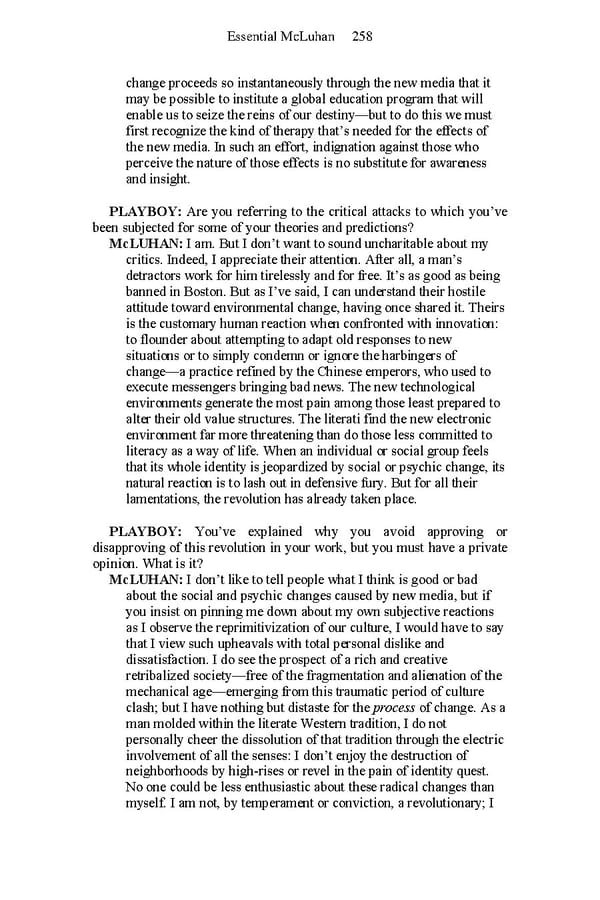Essential McLuhan 258 change proceeds so instantaneously through the new media that it may be possible to institute a global education program that will enable us to seize the reins of our destiny—but to do this we must first recognize the kind of therapy that’s needed for the effects of the new media. In such an effort, indignation against those who perceive the nature of those effects is no substitute for awareness and insight. PLAYBOY: Are you referring to the critical attacks to which you’ve been subjected for some of your theories and predictions? McLUHAN: I am. But I don’t want to sound uncharitable about my critics. Indeed, I appreciate their attention. After all, a man’s detractors work for him tirelessly and for free. It’s as good as being banned in Boston. But as I’ve said, I can understand their hostile attitude toward environmental change, having once shared it. Theirs is the customary human reaction when confronted with innovation: to flounder about attempting to adapt old responses to new situations or to simply condemn or ignore the harbingers of change—a practice refined by the Chinese emperors, who used to execute messengers bringing bad news. The new technological environments generate the most pain among those least prepared to alter their old value structures. The literati find the new electronic environment far more threatening than do those less committed to literacy as a way of life. When an individual or social group feels that its whole identity is jeopardized by social or psychic change, its natural reaction is to lash out in defensive fury. But for all their lamentations, the revolution has already taken place. PLAYBOY: You’ve explained why you avoid approving or disapproving of this revolution in your work, but you must have a private opinion. What is it? McLUHAN: I don’t like to tell people what I think is good or bad about the social and psychic changes caused by new media, but if you insist on pinning me down about my own subjective reactions as I observe the reprimitivization of our culture, I would have to say that I view such upheavals with total personal dislike and dissatisfaction. I do see the prospect of a rich and creative retribalized society—free of the fragmentation and alienation of the mechanical age—emerging from this traumatic period of culture clash; but I have nothing but distaste for the process of change. As a man molded within the literate Western tradition, I do not personally cheer the dissolution of that tradition through the electric involvement of all the senses: I don’t enjoy the destruction of neighborhoods by high-rises or revel in the pain of identity quest. No one could be less enthusiastic about these radical changes than myself. I am not, by temperament or conviction, a revolutionary; I
 Essential McLuhan Page 264 Page 266
Essential McLuhan Page 264 Page 266